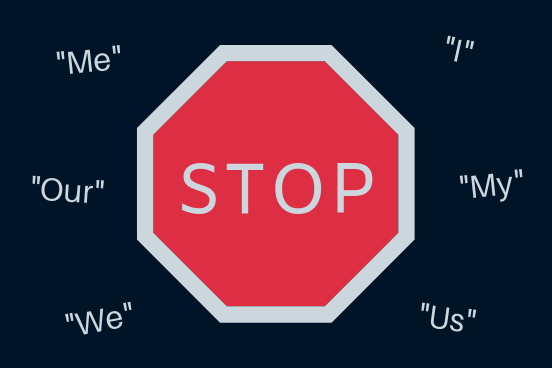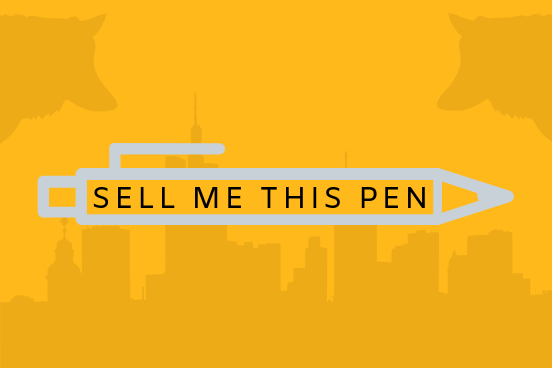
It may seem counter-intuitive to suggest that talking about yourself in a bid is a mistake. The fact however, is that bidding should be far less about you as a company, and much more about your buyer and how their issues and needs can be addressed.
This article discusses why and how you should stop talking about yourself in your bids.
Understand Their Problem
Put simply, if you only write about yourself, the buyer won’t think you know enough about them. The buyer has to be 100% certain that you understand their requirements. If you can’t show this, then how are they to know that your solution is suitable?
At the very least you need to have read and thoroughly understood their specification and requirements. If you fail to do this, you may end up trying to meet a need that isn’t there or not meeting any at all.
At best, you should do everything possible to learn about the buyer, their premises, culture and aims. Attend all the site visits, pre-procurement events and drinks soirées you can. Form relationships with key decision makers and gather as much information as possible. This engagement will help to contextualise the project for yourself and your team and should be reflected in your final proposal.
Address Their Problem
Don’t just explain the features of your product or service. You won’t get far unless you are able to properly convey the tangible value your solution offers.
You should be able to explain how you will meet specific needs the buyer may have. If you’re talking about a feature that they don’t need, haven’t asked for, or that won’t help them, you will only be proving that you do not understand them.
You need to relate to your reader, much in the same way that a comedian, preacher or politician relates to their audience. The reader needs to understand what you are saying and why you are saying it. They should be able to imagine exactly how each aspect of your solution will directly affect a specific aspect of their business.
Stop ‘We’-ing

If every paragraph starts with ‘We’, ‘I’ or ‘Our’, that paragraph is not about the buyer, it’s about you.
At the very least, the first paragraph of a section should be about the problems the buyer faces and why they need help. Show the buyer here, that in formulating your solution, you have considered their requirements (both specified and otherwise) in depth.
If you continuously talk about ‘us’ and ‘our product’, the buyer will trust you far less, than if you first talked about their needs and aims.
When you do come around to talking about your solution, they will then have a much clearer picture of how you will directly impact them. They will have much more confidence in you as a result.
Don’t Be Arrogant
It’s a commonly held idea throughout society, that talking about yourself too much can come across as arrogant, egotistical and self-centred. The same applies in bids.
Don’t include sections on your company history, irrelevant awards you’ve won, or the pride you have in your accomplishments. You will only come across as vain and self-serving. If you’re asked to give this information, do it humbly and quickly. No one likes a show-off and talking about yourself too much will probably make you seem like one.
Have a Conversation
If all you do is lecture, the chances of you talking about yourself (inadvertently or not) can only increase. Instead, adjust your writing style to towards openness and conversation.
Conversation is as much about listening as it is about speaking. This sentiment applies to bidding as well. Written work is obviously not a conversation in that sense of the word, however there is still a dialogue to be explored.
As we have discussed above, in showing that you understand the buyer, you are showing that you have listened. In responding directly to what you have heard and learned, you are then directly addressing the buyer as though in conversation.
By approaching your bid as though it’s a conversation, everything from your style and tone, to the solution itself will appear much more appealing to your buyer and they will be far more inclined to select you.
“Sell Me This Pen”

When writing your next bid, think of the ‘sell me this pen’ cliché. A classic interview question designed to divide the wheat from the chaff in the sales world.
The solution to this problem has been thoroughly canvassed both in business and popular culture. It is not to discuss the pen’s USP’s or why it’s the “best pen ever made”. It’s about asking probing questions, understanding your buyer and making them realise not how nice the pen is, but actually how much they always needed the pen in the first place. People don’t like to to be sold to, but they do like selling an idea to themselves.
What Now?
The idea behind this article is not to prohibit you from ever talking about yourself again or to suggest that your solution will be at all inconsequential to the buyer. On the contrary, your product and service offering should play a key role in your bids.
The idea here, is instead to try and shift your thinking and approach. In bidding, and perhaps in life as well, consider others before yourself and you may find extra success as a result.
Did you enjoy this post?
Click here to learn about 10 more bid writing mistakes and how to avoid them.
Follow Bespoke Bids on Linkedin to keep up with our day-to-day operations. We post live tenders, tips and tricks and more.


